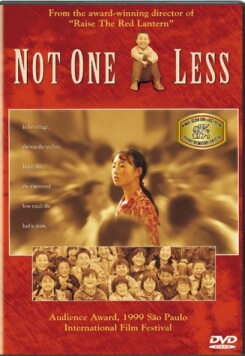Not One Less
Not One Less, directed by Zhang Yimou (Ju Dou, Raise the Red
Lantern etc) is a propaganda film, a sad come-down for a very talented guy,
I think—though its portrait of life among some of the poorest villages of
China today is brilliantly rendered and memorably affecting. Here, too, is
truth, and this is not something that one expects from propaganda. The other
curious thing about it is that it is not only based on actual events, but the
people who took part in those events play themselves in the movie. This to me is
almost unbelievable, especially in light of the fact that both the central
characters, Wei Minzhi and Zhang Huike, are children and natural actors. Perhaps
Zhang Yimou only decided to make the film this way when he realized what a
treasure he’d found in these two. Or perhaps all Chinese children are natural
actors.
The story is set in a village so poor that the one room elementary school
(its only school) can scarcely afford chalk, and the children who attend it
frequently have to be taken out of school in order to help their families by
working in the fields. The village schoolmaster, Teacher Gao (Gao Enman) is
called away on family business and so must find a substitute teacher for the
month he will be away. The local authority sends him Wei, a 13 year-old girl who
has only just finished elementary school herself. “No one [else] will come,” he is told. “This is a remote village, far from everything. No
one wants to come.”
Teacher Gao must make the best of it. He interviews his diminutive
replacement, asking her “What can you do?” She is tongue-tied. At last she
answers: “Sing”
“Sing something,” says Teacher Gao. When she starts singing a patriotic,
Maoist song with the appropriate hand gestures, she has to stop in the middle,
having forgotten the rest. And she doesn’t know any other songs. “You can’t sing
one song for a month,” says Teacher Gao.
But what choice does he have? He shows her his precious supply of chalk.
There are 26 pieces of chalk for the 26 days he will be away. With careful use,
each piece will last for one day—a day spent, obviously, with her writing
on the board and the other children copying what she has written—but only
if she makes the ideograms only “as big as donkey’s turd.” Above all, Teacher
Gao says, she must take care not to lose any of the little class. He has already
lost ten pupils this year. They are always slipping away from the school because
their parents need them to work. She should earn 50 yuan for the month’s work
(though Gao himself has not been paid for six months) and an extra ten yuan if
she doesn’t lose any more. “Not one less,” he says.
The words of the title also stand for the extreme frugality that must be
practiced by these desperately poor people. Of course one of the pupils
is taken away, the young troublemaker Zhang Huike, and Wei, grimly
determined to earn her extra 10 yuan, goes off to the city in search of him. She
herself has never been to the city, has no idea how it works or how much things
cost, and no idea of how to find Zhang Huike once she gets there. There are a
number of heart-tugging incidents caused by her predictable failures and
hardships, but always this remarkable child’s combination of impassivity and
barely suppressed emotion contrive to move us—even when a deus ex
machina comes along in the form of what passes in China for a media frenzy
over her.
Gifts for the school pour into the village, but the children can scarcely
comprehend it. “So much chalk. We won’t have to buy any more,” says one.
“Lets save it for Teacher Gao,” says another.
The film ends with an announcement that “poverty forces more than one million
children in China each year to leave school.” This seems to be a typically
disingenuous, quasi-official announcement by the Chinese government, so there is
naturally no mention of the extent to which that poverty is the result of 40
years of economic mismanagement under the predecessors of the present Communist
régime. But as things begin to improve in China, films like this afford
us a glimpse of just how bad things must have been before the economic changes
of the past ten years.
Discover more from James Bowman
Subscribe to get the latest posts to your email.








